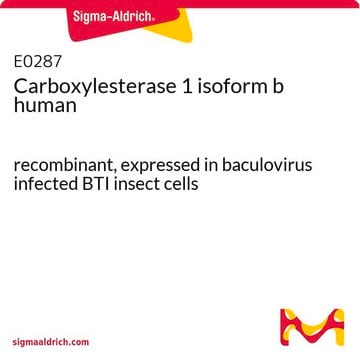Alle Fotos(5)
Wichtige Dokumente
C1682
Acetylcholinesterase human
recombinant, expressed in HEK 293 cells, lyophilized powder, ≥1,000 units/mg protein (Lowry)
Synonym(e):
AChE, Acetylcholin-Acetylhydrolase
Anmeldenzur Ansicht organisationsspezifischer und vertraglich vereinbarter Preise
Alle Fotos(5)
About This Item
Empfohlene Produkte
Allgemeine Beschreibung
Acetylcholinesterase (AChE) is a serine hydrolase, which belongs to the carboxyl esterase family of enzymes. AChE is localised at neuromuscular junctions and cholinergic brain synapses.
Anwendung
Acetylcholinesterase human has been used:
- as a standard protein to measure protein levels acetylcholinesterase AChE-R and AChE-S
- to stimulate human fibroblasts
- to study its in vitro catalytic activity and to determine the effects of metals, H2O2 and OH radicals on the activity
Biochem./physiol. Wirkung
Acetylcholinesterase (AChE) is regarded as a biomarker in neurotoxicity. It is a modulator of nitric oxide signal transduction pathway and marker of membrane integrity and aging. AChE, hydrolyzes choline esters. It terminates the impulse transmission at cholinergic synapses. AChE does this by rapid hydrolysis of the neurotransmitter acetylcholine (ACh) to acetate and choline. AChE inhibitors prevent the cholinesterase enzyme from breaking down ACh and increases the level and duration of the neurotransmitter action.
Major degradative enzyme for acetylcholine in vivo. Converts acetylcholine + H2O to choline + acetic acid.
Einheitendefinition
One unit will hydrolyze 1.0 μmole of acetylthiocholine to thiocholine and acetate per minute at pH 8.0 at 37 °C.
Physikalische Form
This product is supplied as a lyophilized powder. Lyophilized from 0.22 μm filtered solution in 50mM phosphate buffer pH8.
Hinweis zur Analyse
The activity obtained using acetylcholine as substrate is 30-100 times that obtained with butyrylcholine, using acetylcholinesterase from electric eel.
Lagerklassenschlüssel
11 - Combustible Solids
WGK
WGK 3
Flammpunkt (°F)
Not applicable
Flammpunkt (°C)
Not applicable
Analysenzertifikate (COA)
Suchen Sie nach Analysenzertifikate (COA), indem Sie die Lot-/Chargennummer des Produkts eingeben. Lot- und Chargennummern sind auf dem Produktetikett hinter den Wörtern ‘Lot’ oder ‘Batch’ (Lot oder Charge) zu finden.
Besitzen Sie dieses Produkt bereits?
In der Dokumentenbibliothek finden Sie die Dokumentation zu den Produkten, die Sie kürzlich erworben haben.
Kunden haben sich ebenfalls angesehen
In vitro effect of H 2 O 2, some transition metals and hydroxyl radical produced via fenton and fenton-like reactions, on the catalytic activity of AChE and the Hydrolysis of ACh
Mendez-Garrido A, et al
Neurochemical Research, 39(11), 2093-2104 (2014)
Different cholinesterase inhibitor effects on CSF cholinesterases in Alzheimer patients
Nordberg A, et al.
Current Alzheimer Research, 6(1), 4-14 (2009)
Sebastian Oddsson et al.
Molecules (Basel, Switzerland), 25(12) (2020-06-26)
Despite extensive efforts in the development of drugs for complex neurodegenerative diseases, treatment often remains challenging or ineffective, and hence new treatment strategies are necessary. One approach is the design of multi-target drugs, which can potentially address the complex nature
Agneta Nordberg et al.
Current Alzheimer research, 6(1), 4-14 (2009-02-10)
The current study aimed to compare the effects of different cholinesterase inhibitors on acetylcholinesterase (AChE) and butyrylcholinesterase (BuChE) activities and protein levels, in the cerebrospinal fluid (CSF) of Alzheimer disease (AD) patients. AD patients aged 50-85 years were randomized to
Acetylcholinesterase from human erythrocytes as a surrogate biomarker of lead induced neurotoxicity
Gupta VK, et al.
Enzyme Research, 2015 (2015)
Unser Team von Wissenschaftlern verfügt über Erfahrung in allen Forschungsbereichen einschließlich Life Science, Materialwissenschaften, chemischer Synthese, Chromatographie, Analytik und vielen mehr..
Setzen Sie sich mit dem technischen Dienst in Verbindung.



